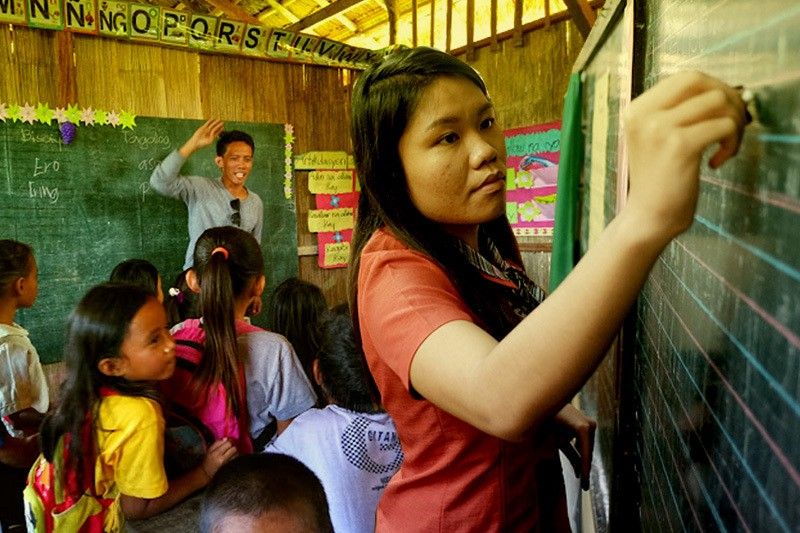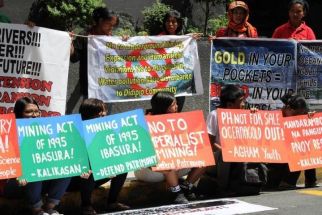Teachers need resources, curriculum flexibility to make climate change education stick

Second of a two-part special report on climate change education. Read the first story here
MANILA, Philippines — Seeing his students grind through hours-long classes in the stifling heat, science teacher Mark John Bello is convinced that his students have by now grasped the seriousness of climate change.
How he knows this is thanks to a quick throwaway comment from one of his Grade 9 students at the end of a lesson: “Sir ang init! Climate change na talaga ngayon no? (Sir, it’s so hot! Climate change is really happening, right?”)
It was not rare to hear kids complain about the heat in May when he had these conversations. But aside from the prized few who can rattle off facts about the greenhouse gases trapped in the atmosphere — Bello can count them on one hand — he admits that, by and large, climate change is “not taught in a deep way.”
A science major in college, Bello would know how to deepen the discussion and spring past rudimentary lessons on global warming. Not just the effects or causes of climate change, he said, but “what we can do about it.”
But Bello says the class already tackled climate change in the previous quarter of the academic year. “You can’t teach lessons based on a whim. Everything has to be aligned with the quarter.”
Teachers like Bello are required to teach according to what’s prescribed in the Department of Education curriculum and not when it’s timely to discuss lessons with rapid developments like climate change.
These curriculum guides, while intended to provide a standardized framework for teaching various subjects, often limit educators’ flexibility and creativity, according to Philippine Science High School teacher Chuckie Calsado.
Deviating from the curriculum would mean missing certain learning competencies required by DepEd offices from the schools in their divisions.
But science teachers interviewed by Philstar.com say that what the country needs is more skills training for educators and answers to the country’s classroom and learning resource shortages.
Curriculum deviation
Climate change has not been comprehensively taught in schools even after the Philippines revised its basic education curriculum in 2012.
DepEd’s K to 12 curriculum introduces the topic of “climate” to Grade 7 students — mostly 12- to 13-year-olds — in the fourth quarter. Discussions, however, are only on the differences between climate and weather.
Students delve more into climate change in the third quarter of Grade 9, although the teaching of the topic still focuses on the basic aspects such as the science behind climate change, its impacts and the strategies for adaptation.
Based on the curriculum, learners aged 14 or 15 are expected to participate in activities that minimize the effects of climate change.
Educators, however, stressed that rigid adherence to the curriculum can restrict teachers’ ability to customize lessons to meet the needs of students and incorporate current events and real-world examples. This can hinder learners’ critical thinking, they said.
For Calsado, the curriculum should not be treated as a “bible that cannot be broken and changed,” but rather as a guide that can be adjusted as needed.
The biology teacher at Philippine Science High school noted that teachers rely on the prescribed curriculum due to lack of time and because they do not know that “they have the power to go beyond.” Pisay, the country’s top science high school, does not completely follow the DepEd curriculum.
“If they stay within the rules, within the limit situation of the curriculum, they will not develop students with critical consciousness,” Calsado said.
Leah Cortez, a professor at the Philippine Normal University who teaches science teachers in graduate school, said that climate change — a phenomenon reshaping the future of the younger generations — must be taught across subjects and grade levels as early as Grade 1.
“Climate change is not just a topic in the curriculum or a subject… You can teach that to students any time because it is part of life,” Cortez said.
Experiential learning
Teachers said their students often have difficulty applying climate change concepts to their daily lives.
A study conducted by PNU in 2018 suggested that even though Grade 10 students were “moderately knowledgeable” about climate change, they did not apply the concepts learned in the classroom in real life to decrease their carbon footprint.
Cortez said that experiential learning — or the process of learning by doing — can help students better connect concepts learned in class discussions to real-world situations. Experiential learning opportunities may include field trips and community visits and service.
“It is important for us to make climate change education more engaging, relevant, and applicable to our daily lives,” Cortez said. “If your students will not see the sense of what you’re teaching them, for example, carbon dioxide emissions, it becomes irrelevant.”
In the case of Calsado’s students at Pisay, their analyses of climate change go beyond the doom and gloom, and instead focus on solutions to the problem.
For example, Calsado asks his students to assess the significance of reports by the Intergovernmental Panel on Climate Change and the effectiveness of the landmark Paris Agreement. He also requires his students to compare local laws with legislation overseas and evaluate how successful these are in addressing climate change.
“They are seeing possible systemic rooted solutions rather than just saying: ‘we should save the turtles, don’t use plastic, or use metal straws,’” Calsado said.
Teacher mastery
Of the 58,000 teachers UNESCO surveyed from 100 countries — including the Philippines — in 2021, fewer than two out of five were "confident in teaching about the severity of climate change.”
In its report “Getting every school climate-ready: How countries are integrating climate change issues in education,” UNESCO noted that around 30% of teachers reported that they were not familiar with how to best teach climate change.
One in five teachers also “did not have the ability to choose their own subjects or the time to teach the topic, or felt they didn’t have the necessary knowledge and skills,” the report found.
Science teacher Leonora Calicdan, who has taught for 25 years at Mangaldan High School in Pangasinan, said that some students' poor science competencies can be traced back to the "shortage of qualified teachers" in schools.
“Like in our school, there are science teachers who major in math and yet they were asked to teach science,” Calicdan said.
Cortez stressed the need to provide all teachers — not just those teaching science — resources such as training to improve the integration of climate-related topics and discussions in any grade level and even extracurricular activities.
Addressing basic inputs
Calicdan also said that there is a dire shortage of textbooks, science equipment and modules that comprehensively tackle science lessons.
“We have prepared modules, which are not really screened. If you analyze the modules, it’s a half-baked module,” Calicdan said.
She said that instead of explaining science concepts, teachers have to cram information into limited pages. “As a result, we are unable to include sufficient science ideas. We cannot elaborate on them anymore, so we need to minimize the science concepts,” she said.
“These are the reasons I know which contribute to poor results of science teaching,” she added.
Before asking teachers to find the time and energy to creatively teach climate change, Calsado said that the government must first address basic inputs in education.
“With the curriculum and resources that we have, with the classrooms that we have, with the change in academic calendar, we’ve been shooting our own foot,” Calsado added.
- Latest































